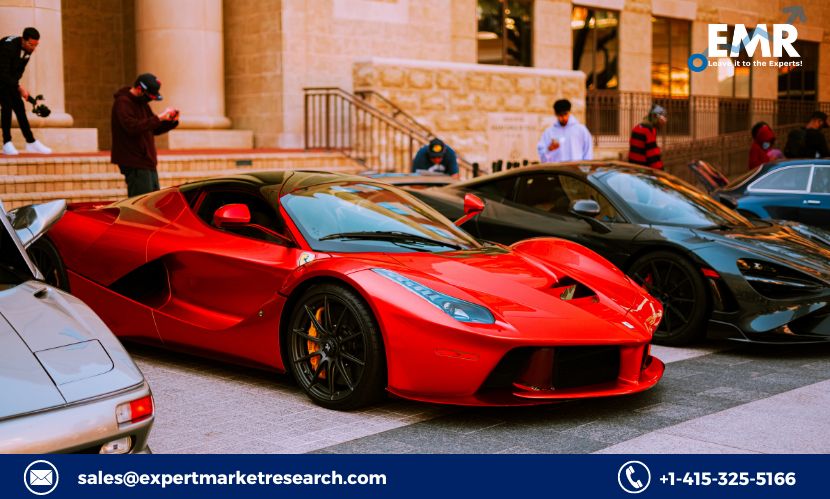
The global luxury car market size is poised for steady growth, reaching a size of USD 483.84 billion in 2024 and projected to expand at a CAGR of 4.9% from 2025 to 2033. By 2033, the market is expected to attain a value of approximately USD 744.20 billion. This growth reflects increasing consumer demand for high-performance, technologically advanced, and premium vehicles, driven by rising disposable incomes and evolving lifestyle preferences.
In this blog post, we explore the key market dynamics, including growth drivers, challenges, and emerging trends, while examining the market segmentation and future prospects of the luxury car industry.
Key Drivers of Growth
1. Increasing Disposable Incomes and Economic Growth
The rising disposable incomes of middle and upper-class consumers, particularly in emerging economies, are fueling demand for luxury cars. Consumers in regions like Asia-Pacific and the Middle East are becoming more willing to invest in premium vehicles that reflect their social status and provide unparalleled comfort.
2. Advancements in Automotive Technology
Luxury car manufacturers continuously integrate advanced technologies such as autonomous driving, AI-based systems, and connected car solutions. Features like adaptive cruise control, lane-keeping assistance, and augmented reality displays are setting luxury vehicles apart, appealing to tech-savvy consumers.
3. Rising Demand for Electrification
Electric vehicles (EVs) are rapidly gaining popularity in the luxury segment. Companies like Tesla and Porsche have demonstrated the appeal of luxury EVs by offering cutting-edge designs and eco-friendly solutions without compromising on performance. The shift towards electrification is aligning with stricter environmental regulations, making luxury EVs a key growth driver.
4. Expanding Product Portfolios
Luxury car manufacturers are diversifying their offerings to cater to different customer preferences. From high-performance sports cars to ultra-luxurious SUVs, brands are targeting a wider audience. This variety is attracting both younger buyers looking for dynamic performance and families seeking spacious yet premium vehicles.
Challenges in the Luxury Car Market
1. High Costs of Manufacturing and Maintenance
Luxury cars are synonymous with advanced features, premium materials, and bespoke craftsmanship. While these elements appeal to consumers, they also contribute to higher production and maintenance costs, which can limit market access to only the wealthiest consumers.
2. Stringent Environmental Regulations
Governments worldwide are imposing stricter emission norms to combat climate change. While this is driving innovation in luxury EVs, it also presents challenges for manufacturers of traditional internal combustion engine (ICE) luxury cars, requiring substantial investments in R&D to meet compliance standards.
3. Market Volatility and Economic Downturns
The luxury car market is sensitive to economic fluctuations. During periods of economic instability, consumer spending on high-ticket items like luxury vehicles tends to decline, which can impact overall market growth.
Emerging Trends
1. Focus on Electric Luxury Cars
Electric luxury cars are transforming the industry, with manufacturers like Ferrari, Lamborghini, and Rolls-Royce launching EV models to align with sustainability goals. Features like long-range batteries, ultra-fast charging, and seamless integration with smart home systems are enhancing the appeal of luxury EVs.
2. Integration of Autonomous Driving Technologies
Autonomous driving features, such as self-parking and highway autopilot, are becoming standard in luxury cars. As technology advances, fully autonomous luxury cars could become a reality, offering unparalleled convenience and safety.
3. Rise of Ultra-Luxury SUVs
SUVs continue to dominate the global automotive market, and the luxury segment is no exception. Brands like Bentley, Maserati, and Rolls-Royce have launched ultra-luxury SUVs that combine off-road capabilities with premium interiors and advanced technology.
4. Personalisation and Bespoke Offerings
Consumers are increasingly seeking personalisation in their vehicles, from custom paint jobs to tailored interiors. Luxury carmakers are capitalising on this trend by offering bespoke services, allowing customers to create one-of-a-kind vehicles that reflect their personal tastes.
Market Segmentation
By Vehicle Type
The market is segmented into sedans, SUVs, sports cars, and others. SUVs dominate due to their versatility and growing consumer preference for spacious vehicles. However, sports cars remain a significant segment, driven by enthusiasts seeking high performance and exclusivity.
By Drive Type
The market includes internal combustion engine (ICE) vehicles, electric vehicles (EVs), and hybrid vehicles. While ICE vehicles still hold a large share, EVs and hybrids are rapidly gaining traction due to growing environmental awareness and supportive government policies.
By Price Category
The market is divided into entry-level luxury, mid-level luxury, and ultra-luxury segments. Ultra-luxury cars, priced at the high end, cater to an exclusive clientele seeking the pinnacle of comfort, performance, and exclusivity.
By Region
North America and Europe remain dominant markets for luxury cars, thanks to established brands and a high concentration of affluent consumers. However, Asia-Pacific is emerging as a major growth region, driven by rising disposable incomes and increasing demand for premium vehicles in countries like China, Japan, and India.
Key Players in the Luxury Car Market
Prominent players in the global luxury car market include:
- Ferrari S.p.A: Renowned for high-performance sports cars and exclusive designs.
- Bugatti Automobiles: Known for ultra-luxury hypercars that push the boundaries of speed and innovation.
- Rolls-Royce Motor Cars: A symbol of ultimate luxury and bespoke craftsmanship.
- Daimler AG: Parent company of Mercedes-Benz, offering cutting-edge technology and premium designs.
- Automobili Lamborghini S.p.A.: Focused on high-performance sports cars and SUVs.
- Koenigsegg Automotive AB: Specialising in limited-edition hypercars with exceptional engineering.
- Aston Martin Lagonda Limited: Combining timeless elegance with advanced performance.





Leave a Reply